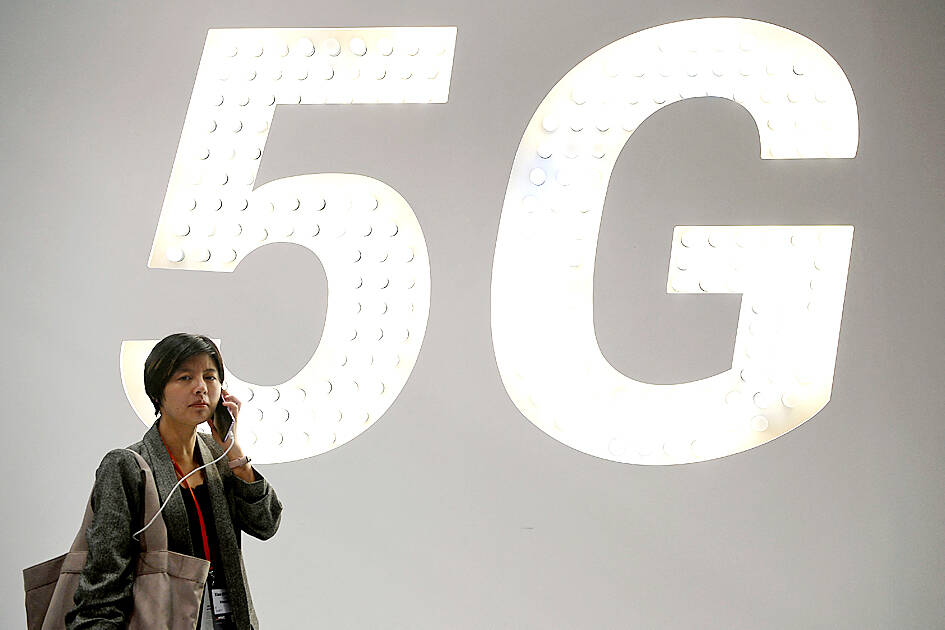The nation’s major telecoms on Tuesday posted robust revenue for last year, as growth in mobile 5G subscriptions helped boost average revenue per user (ARPU).
Chunghwa Telecom Co (中華電信) reported that revenue expand 3 percent annually to NT$216.74 billion (US$7.12 billion) last year, surpassing the company’s high-end projection of NT$214 billion.
Net profit rose 2.1 percent to NT$36.52 billion last year, beating its estimate of NT$36.04 billion and reaching its highest level in about four years, it said.

Photo: AFP
Earnings per share (EPS) rose to NT$4.71 last year from NT$2.1 in 2021.
“Rises in ARPU for the mobile and fixed-line businesses helped boost the company’s net profits,” Chunghwa Telecom chairman Sheih Chi-mau (謝繼茂) said in a statement. “Additionally, 5G-based information-and-communications projects also helped.”
Last month, mobile ARPU rose 5 percent annually, the 21st month of increases, which Chunghwa Telecom attributed to a rise in 5G subscribers. The company did not disclose its number of 5G subscribers.
Taiwan Mobile Co (台灣大哥大) said that revenue last year expanded 10 percent year-on-year to an all-time high of NT$172.21 billion.
The firm’s e-commerce subsidiary Memo.com Inc (富邦媒體), one of its major growth engines, saw revenue soar 17 percent to more than NT$103.44 billion last year.
Net profit rose 0.36 percent to NT$11.03 billion from 2021. EPS edged higher to NT$3.91 from NT$3.9 a year earlier, it said.
“The upgrade to 5G services and exclusive mobile packages helped boost the company’s mobile ARPU 1.8 percent annually to NT$662 million in December, for 19 months of increases,” Taiwan Mobile chief financial officer George Chang (張家麒) said in a statement.
As a result, mobile service revenue expanded 3.3 percent annually last month to NT$394.4 billion, hitting the highest level in three years, Chang said.
Far EasTone Telecommunications Co (遠傳電信) said that revenue last year increased 4.5 percent from a year earlier to NT$89.15 billion, after mobile service revenue climbed 2.9 percent to NT$49.82 billion in the year and growth in 5G mobile users drove up its ARPU 3.6 percent from a year earlier.
Net profit rose 5.3 percent to NT$9.61 billion from NT$9.12 billion in 2021, with EPS expanding from NT$2.8 to NT$2.95, the firm said.

NEW IDENTITY: Known for its software, India has expanded into hardware, with its semiconductor industry growing from US$38bn in 2023 to US$45bn to US$50bn India on Saturday inaugurated its first semiconductor assembly and test facility, a milestone in the government’s push to reduce dependence on foreign chipmakers and stake a claim in a sector dominated by China. Indian Prime Minister Narendra Modi opened US firm Micron Technology Inc’s semiconductor assembly, test and packaging unit in his home state of Gujarat, hailing the “dawn of a new era” for India’s technology ambitions. “When young Indians look back in the future, they will see this decade as the turning point in our tech future,” Modi told the event, which was broadcast on his YouTube channel. The plant would convert

‘SEISMIC SHIFT’: The researcher forecast there would be about 1.1 billion mobile shipments this year, down from 1.26 billion the prior year and erasing years of gains The global smartphone market is expected to contract 12.9 percent this year due to the unprecedented memorychip shortage, marking “a crisis like no other,” researcher International Data Corp (IDC) said. The new forecast, a dramatic revision down from earlier estimates, gives the latest accounting of the ongoing memory crunch that is affecting every corner of the electronics industry. The demand for advanced memory to power artificial intelligence (AI) tasks has drained global supply until well into next year and jeopardizes the business model of many smartphone makers. IDC forecast about 1.1 billion mobile shipments this year, down from 1.26 billion the prior

People stand in a Pokemon store in Tokyo on Thursday. One of the world highest-grossing franchises is celebrated its 30th anniversary yesterday.

Zimbabwe’s ban on raw lithium exports is forcing Chinese miners to rethink their strategy, speeding up plans to process the metal locally instead of shipping it to China’s vast rechargeable battery industry. The country is Africa’s largest lithium producer and has one of the world’s largest reserves, according to the US Geological Survey (USGS). Zimbabwe already banned the export of lithium ore in 2022 and last year announced it would halt exports of lithium concentrates from January next year. However, on Wednesday it imposed the ban with immediate effect, leaving unclear what the lithium mining sector would do in the